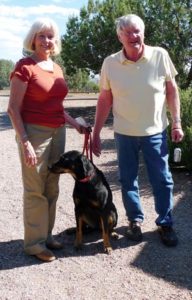 I moved to beautiful Prescott, Arizona from sunny Los Angeles in June of last year. Being an outdoors enthusiast, I love the quality of life provided by my adopted community. However, being a Southern California boy, I was a bit unprepared for the dramatic drop in temperature. So I thought I would review for all our cold climate resident pet owners the cold weather dangers for our pets. Be aware of these cold weather safety tips for your pets:
I moved to beautiful Prescott, Arizona from sunny Los Angeles in June of last year. Being an outdoors enthusiast, I love the quality of life provided by my adopted community. However, being a Southern California boy, I was a bit unprepared for the dramatic drop in temperature. So I thought I would review for all our cold climate resident pet owners the cold weather dangers for our pets. Be aware of these cold weather safety tips for your pets:
* Remember: If it is cold for you, it is cold for your pets, too! A common mistake people make is to assume our pets are better equipped to handle cold weather just because they are animals. They are not just animals; they are pets. They are the result of thousands of years of genetic reengineering that has left most companion animals completely dependent on our common sense.
* Although YHS believes all pets should be kept indoors, if you must keep your dog outside for any period of time, provide a dry, draft free dog-house. It should be large enough for your dog to sit and lay down comfortably but small enough to hold his body heat. The floor should be off the ground and covered with cedar shavings or straw. Turn the shelter away from the wind, and cover the door with a waterproof burlap or heavy plastic.
* Make sure all outside water sources don’t freeze over. Pets can’t burn the calories they need to stay warm without a fresh supply of water.
* Be aware of salt and other ice-melting chemicals on the streets and sidewalks. They are an irritant to your pet’s paws and may cause injury if ingested. Use a warm, moist cloth to clean off any salt or chemical residues after a walk. Be the first on your block to provide your dog with a set of booties to protect his paws from these harsh and cold chemicals.
* Check your garage and driveway for antifreeze. Antifreeze tastes sweet to your pet and most brands are poisonous. Contact your veterinarian immediately if you suspect your pet has consumed antifreeze.
* Grooming is important; a matted coat will not protect your pet from the cold. Be watchful of ice or salt that may become entangled in long hair and remove it immediately.
* Don’t let your pet venture onto frozen bodies of water. The ice may be too thin to support his weight and water rescues are both difficult and dangerous for the both of you.
* Be a good kitty Samaritan and slap the hood of your car before starting it. Cats often climb next to a warm engine during the night.
* Keep snowdrifts from piling up next to your fence, providing your pooch a way of escape. Make sure your dog is wearing a current dog license. In the event your dog does get away during this dangerous weather and YHS is able to rescue him, you will be assured of his return. If you love your pet, please license him or her.
* If you are flying with a pet, make sure the airline provides for your pet’s safety and warmth. Some airlines restrict pets from flying when the temperature dips below a certain point. Call ahead to confirm.
Pets are part of the family; keep your family warm, and the winter months can be filled with wonderful memories. If you are looking for a pet to keep you warm this winter, come on by your local animal shelter and they will help you select your next best friend.


